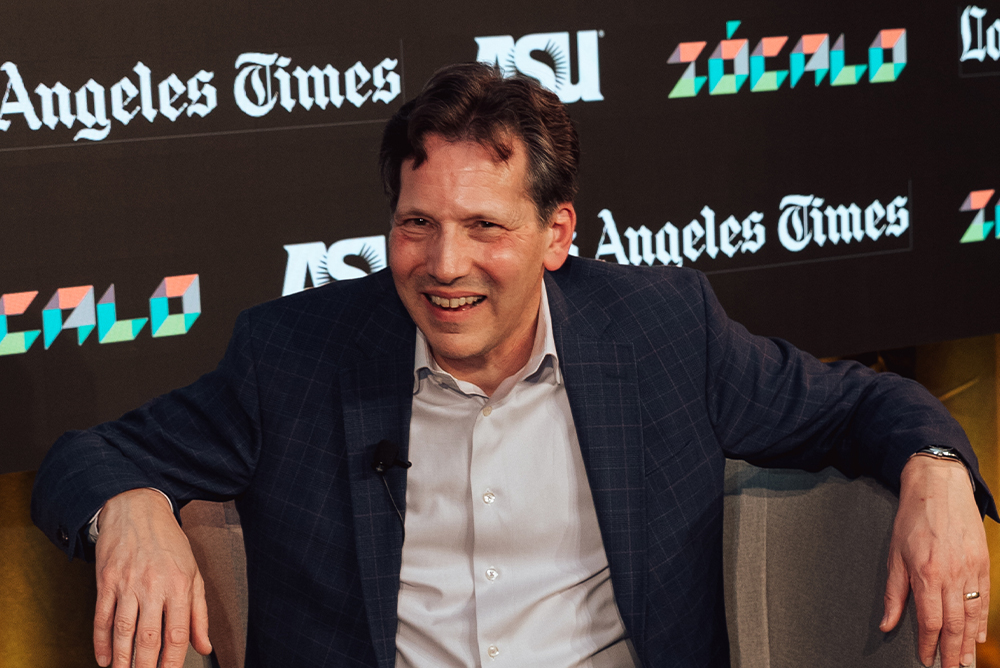
Photo by Chad Brady.
Maxwell L. Stearns is the Venable, Baetjer & Howard Professor of Law at the University of Maryland Francis King Carey School of Law. His latest book, Parliamentary America: The Least Radical Means of Radically Repairing Our Broken Democracy, draws on a world tour of different democracies and outlines a plan to turn the U.S. government into a parliamentary system. Before the Zócalo and Los Angeles Times event “Would Parliamentary America Have More Fun?,” Stearns stopped by our green room to chat Law & Order, constitutional conventions, and how to make the perfect cappuccino.
What’s one of your favorite places to go in Baltimore?
I love going to the Inner Harbor. I run along it in either direction, toward Fells Point or in the direction of Fort McHenry. It’s one of the most beautiful urban spots in America.
What’s some advice you give to your students?
I give two pieces of advice to my students. One, choose a career path where every morning you’re excited to get up because you feel that there’s something you have to do that is important. And two, if the person who is next to you in bed is encouraging that in you, and you’re encouraging that in that person, you will have a good life.
You’re kind of a coffee aficionado. Tell us about your coffee journey.
I love good coffee. And I love strong coffee. I make my own cappuccinos. You can make really great cappuccinos with an investment of under $100 if you get a stovetop macchinetta and a French Press. You can make better foam with the French Press than you can make with a $1,000 machine, and an absolutely fantastic espresso on your stovetop. Be careful about your beans. Never trust a barista to grind your coffee for you. Spend your money on the grinder—that matters.
What’s the most fun you’ve had interacting with government?
I haven’t had a lot of fun interacting with government. I’ve also never had any real problems interacting with government. What frustrates me with government is bureaucracy and the failure to think in ways that businesses do about how to improve the experience for the consumer. I almost feel like if they just could get some folks in with a little bit more business background to say: Let’s look at the way you are serving the people coming, for example, to the DMV or to an immigration office or where you’re getting your parking stickers. Can we rethink this? The fact that you’ve been doing it this way for 40 years isn’t a reason to do it for the next 40 years. Maybe your business models change; maybe we could think of ways to make the interface with the people that are using these government services more friendly. Of course, I’m only focusing on things that seem fairly trivial.
We’re going to play a lightning round of Yay or Nay. (“Yay” if you approve, and “Nay” if you do not approve.)
Constitutional Monarchy. It’s complicated.
The Articles of Confederation. Nay.
Hamilton, the musical. Yay. Absolutely.
This public program is part of a bigger inquiry asking “Can Democracy Survive This Election Year?” So, can democracy survive this election year?
It may depend upon what the outcome of the election is.
What is one of your most annoying blind spots?
I think I’m overcoming this blind spot. But for a long time, one of my most annoying blind spots was imagining that reason and careful analysis could persuade.
What’s your favorite legal drama?
I was a big fan of Law & Order: SVU in particular. Also, a police drama called Hill Street Blues. Those two shows stand out as really thoughtful presentations of how our system of criminal justice works. Yes, they have to simplify things, they have to have dramatical spikes to make it work. But they take their audiences seriously. They’re able to explore the complexities and not make it a flat good versus evil. The more people have a sense of the complexities of our criminal justice system, I think we’re better off as a society.
If we were to have another constitutional convention, who is one person that you would absolutely want there?
First of all, I’m not sure I want a convention. I actually explain in the book why I think we’ve never actually had a constitutional convention. But I think that really, for a convention to be effective, or for Congress to be effective, you have to have people come together and figure out how people who fundamentally disagree can find enough common ground to actually create a framing for how they’ll go into the future. So to name a person, I think, would miss the point. I don’t believe, ultimately, that there is a person who has all the answers. I don’t like the notion of a cult of personality. Everybody’s flawed. But the flip side of that is: Almost everybody might also have something to contribute.



